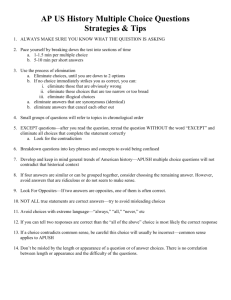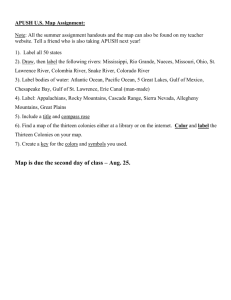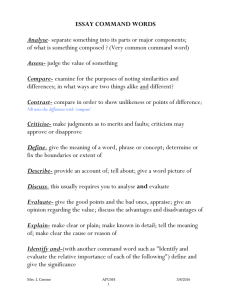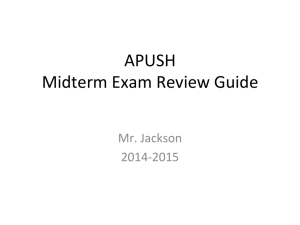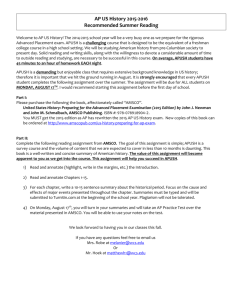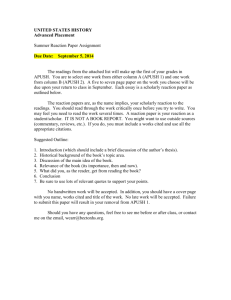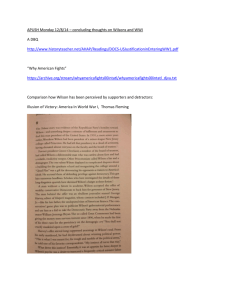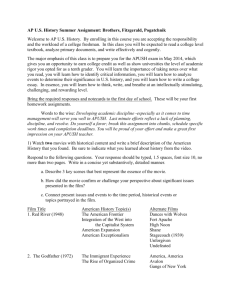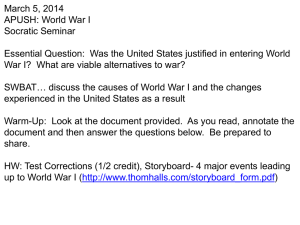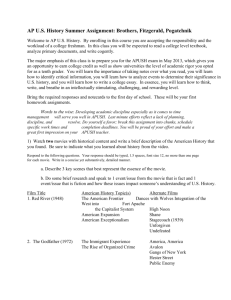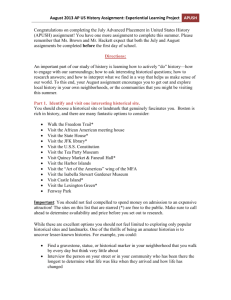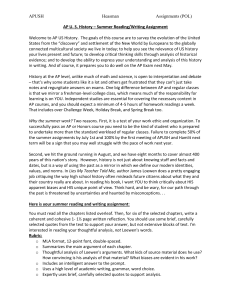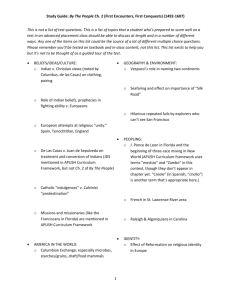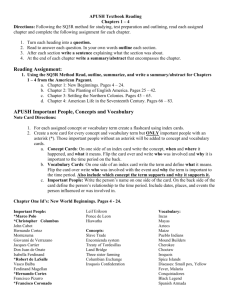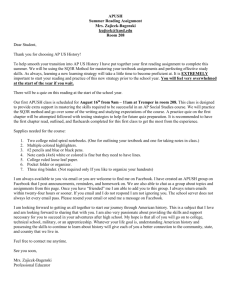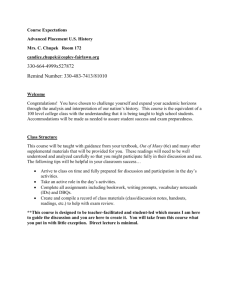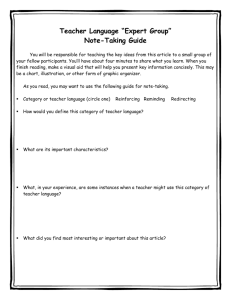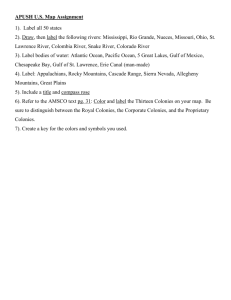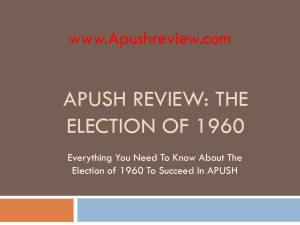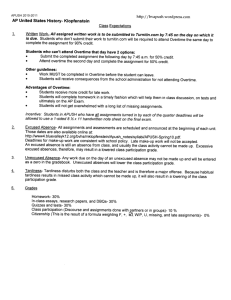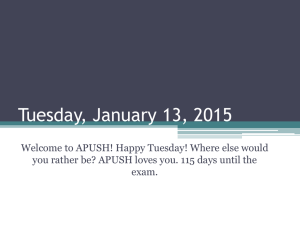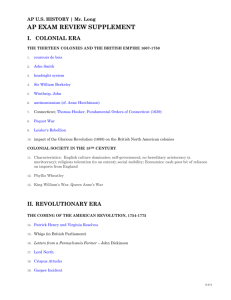Vocabulary List: Ch. 1-2 of The American Pageant
advertisement
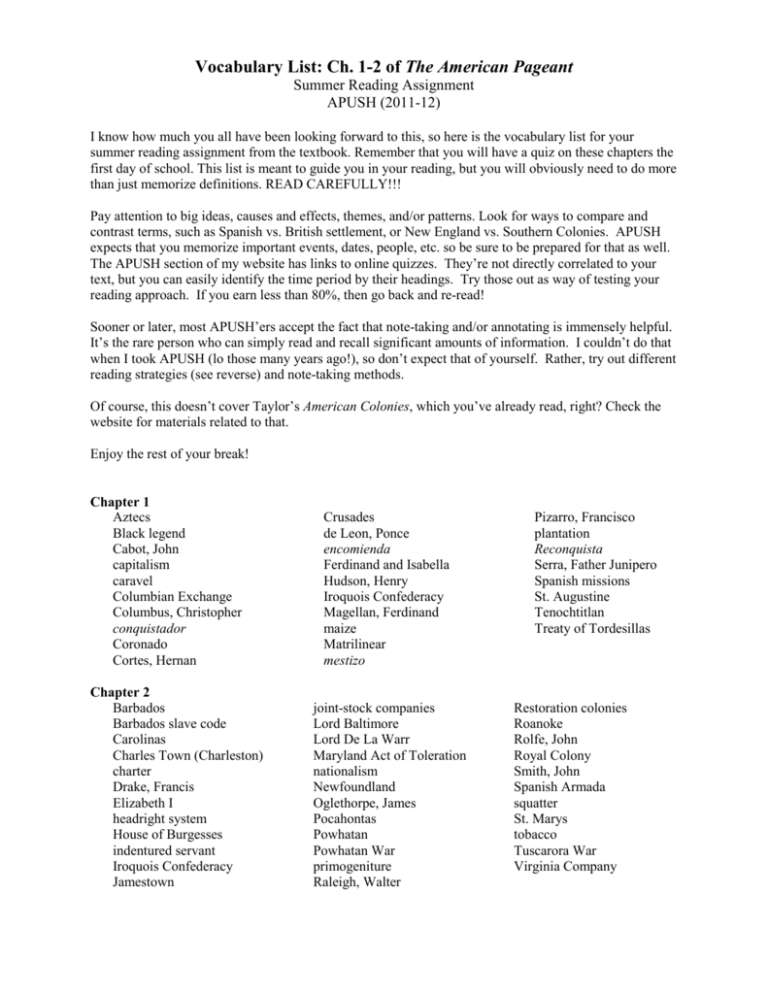
Vocabulary List: Ch. 1-2 of The American Pageant Summer Reading Assignment APUSH (2011-12) I know how much you all have been looking forward to this, so here is the vocabulary list for your summer reading assignment from the textbook. Remember that you will have a quiz on these chapters the first day of school. This list is meant to guide you in your reading, but you will obviously need to do more than just memorize definitions. READ CAREFULLY!!! Pay attention to big ideas, causes and effects, themes, and/or patterns. Look for ways to compare and contrast terms, such as Spanish vs. British settlement, or New England vs. Southern Colonies. APUSH expects that you memorize important events, dates, people, etc. so be sure to be prepared for that as well. The APUSH section of my website has links to online quizzes. They’re not directly correlated to your text, but you can easily identify the time period by their headings. Try those out as way of testing your reading approach. If you earn less than 80%, then go back and re-read! Sooner or later, most APUSH’ers accept the fact that note-taking and/or annotating is immensely helpful. It’s the rare person who can simply read and recall significant amounts of information. I couldn’t do that when I took APUSH (lo those many years ago!), so don’t expect that of yourself. Rather, try out different reading strategies (see reverse) and note-taking methods. Of course, this doesn’t cover Taylor’s American Colonies, which you’ve already read, right? Check the website for materials related to that. Enjoy the rest of your break! Chapter 1 Aztecs Black legend Cabot, John capitalism caravel Columbian Exchange Columbus, Christopher conquistador Coronado Cortes, Hernan Chapter 2 Barbados Barbados slave code Carolinas Charles Town (Charleston) charter Drake, Francis Elizabeth I headright system House of Burgesses indentured servant Iroquois Confederacy Jamestown Crusades de Leon, Ponce encomienda Ferdinand and Isabella Hudson, Henry Iroquois Confederacy Magellan, Ferdinand maize Matrilinear mestizo joint-stock companies Lord Baltimore Lord De La Warr Maryland Act of Toleration nationalism Newfoundland Oglethorpe, James Pocahontas Powhatan Powhatan War primogeniture Raleigh, Walter Pizarro, Francisco plantation Reconquista Serra, Father Junipero Spanish missions St. Augustine Tenochtitlan Treaty of Tordesillas Restoration colonies Roanoke Rolfe, John Royal Colony Smith, John Spanish Armada squatter St. Marys tobacco Tuscarora War Virginia Company Reading Strategies Careful reading is one of the most essential skills in APUSH. As such, knowing how to read your textbook (in particular) is an acquired skill, and here is a list of suggestions: • eliminate all distractions (find a quiet place, turn off electronics, etc.) • use your Vocab. List while this seems obvious, don’t overlook it…have this next to you as you read the text… check off, etc. the terms on the list as you encounter them (they are there for a reason, so you’re accountable for knowing them!)…take notes on them??? • skim the headings, visual aids and excerpts maps, pictures, quotations, etc. are included as essential tools to the understanding… they’re not just decorations (so expect quiz items to cover them)! • DO NOT write annotate, take notes, etc. the first time you read it is often much better to take notes, highlight, etc. once you have become familiar with the content… so read it through once, then go back and double-check for the important facts, conclusions, etc… this way you’re not transcribing the book or playing “paint by numbers” with your highlighter • look for names, dates, and places APUSH places a strong emphasis on knowing these…try to determine what is most significant for the time period and in the broader sweep of history …be sure to understand what happened, but also ask what didn’t happen, if relevant (considering the actions/choices/events that did NOT occur, and ask why) • general categories what is political in nature? economic? social? cultural? military/diplomatic? (these will usually overlap, but that’s okay…) • patterns when are events consistent with the past and when are they new directions? • fact/opinion distinguish between statements of historical fact(s) and the author’s bias • primary vs. secondary sources which bits of evidence are directly from a participant or a witness (then determine the source’s credibility!) and which are not… which is better? This list is not meant to be exhaustive, so use the strategies that will work best for you. Use your performance on the assessments to gauge whether or not your reading strategies are sufficient. You will not be graded for your notes, annotations, etc. Their purpose is to support your learning. If you feel that you’re struggling with the readings, seek out a classmate and compare notes. If that doesn’t help, then make an appointment with me. We will sit down together to discuss your process. Note-taking Method (yes, just one… for now) My personal preference of note-taking methods is a “one-pager.” Simply put, try to hand-write an entire chapter’s worth of notes on one sheet of lined notebook paper (college ruled is better for this). Use short, concise phrases to record everything you think is noteworthy. Use symbols, diagrams, bullets, etc…the less verbiage the better. I think this is valuable because…. 1) you have to identify the most important themes, ideas, and details as you read (good gosh, it can’t ALL be equally important, so what stands out?) 2) it makes you choose your words carefully before you write (geez… think about it first? express it wisely? has an English teacher ever told you this?) 3) it also becomes an excellent study tool prior to assessments (you aren’t really going to re-read eight chapters before an exam, are you?) Obviously, this method doesn’t work so well if you type the notes (simply decreasing the font in order to fit bypasses some of the most beneficial purposes). It will be very challenging, especially the first several times you attempt this. Don’t be surprised if you have to revise your notes in order to fit…. that’s okay! By doing so, you’ll examine your word choice, your selection of facts and themes, review the content again, and hopefully become a more selective reader (remember, quality counts here, not quantity!).
